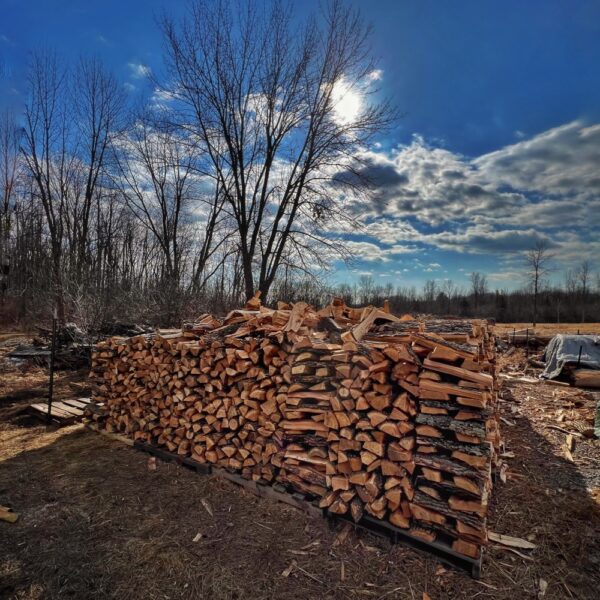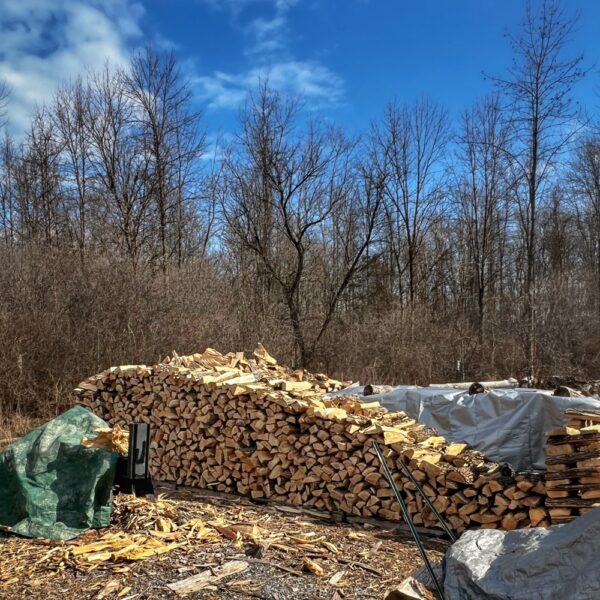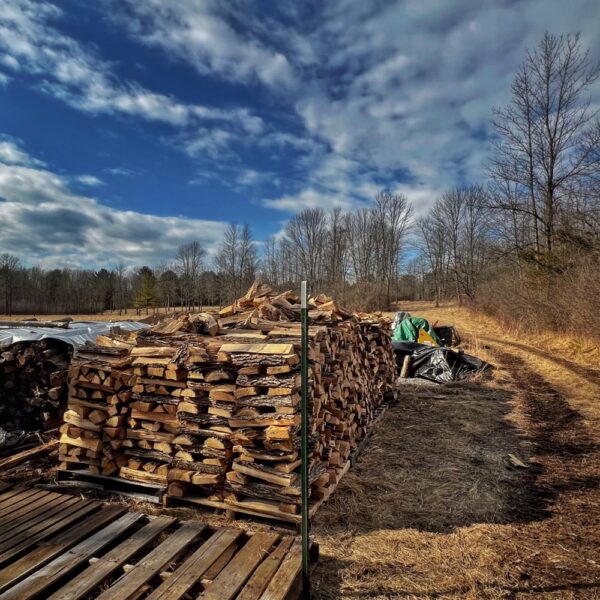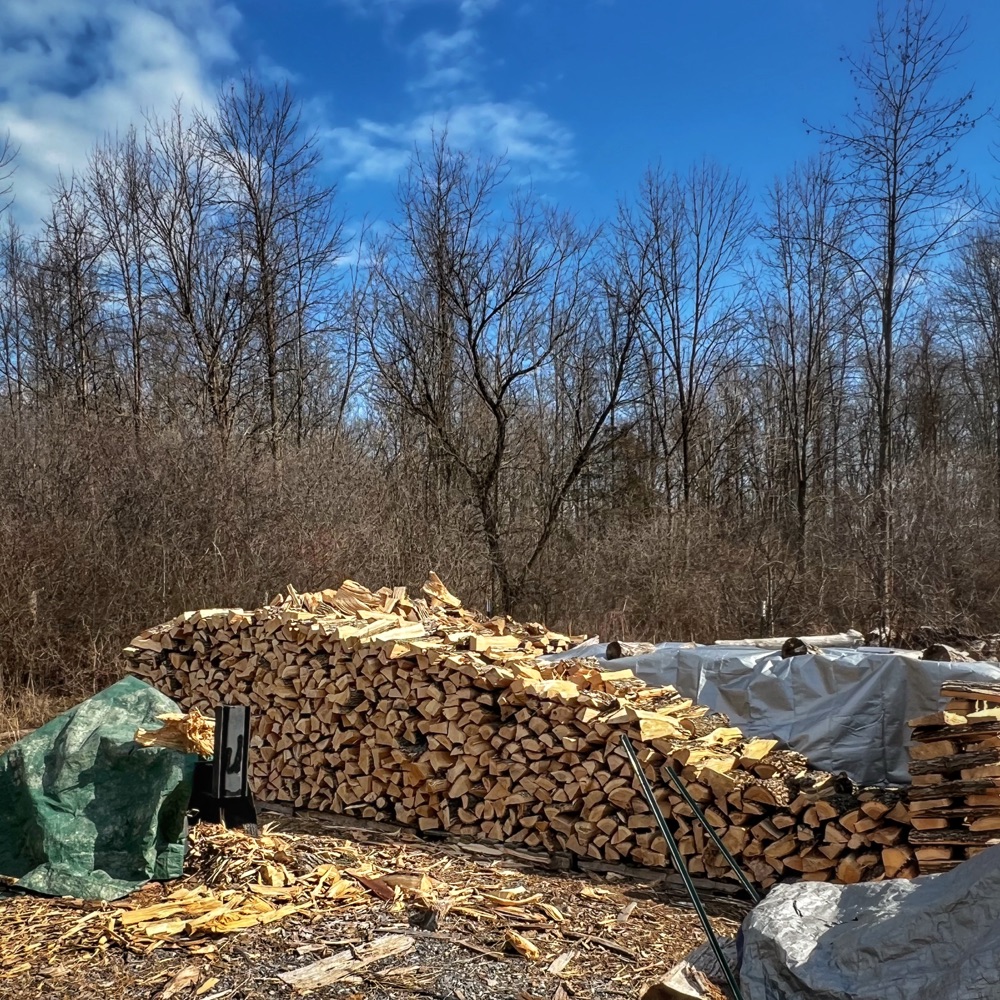Hats off to Steve Cooley who’s responsible for bucking, splitting, and stacking a whole lot of firewood. It’s a good feeling to be laying up firewood for *next* winter when we’re not even through this winter. And that curiously contented feeling prompts me to consider the poetics of firewood.

What I was in my last year of college I had the good fortune of meeting the poet, Hayden Carruth. In a discussion prior to his Lannan Foundation reading at the Folger Shakespeare Library, he was asked by an earnest student and aspiring poet (not I, but not altogether unlike me either) who occupation had best supported his writing. In other words, in pursuit of the decidedly unprosperous vocation of writing poetry, what means of earning a living had been best.
Needless to say, this was a present and pressing concern for many of us drawn to poetry. How to pay the bills?
Splitting and stacking cord wood, Carruth told us. Raised eyebrows prompted him to explain that the manual labor left his mind free to compose poetry. The methodical, mechanical exercise didn’t compete for his mental focus. And while it wasn’t the answer we anticipated, it made sense to me then, and it makes sense to me now.

In fact, I wonder if cutting felled trees into useable lengths, splitting the rounds into wedges, and ranking the split firewood into ranks and cords might actually share something in common with creating poems out of ideas, words, and sounds.
This curiosity about subtle similarities between composing poetry and “firewooding” invites me to contemplate a poetics of firewood. Might there exist a theoretical, structural, discursive art informing the act of bucking, splitting, and stacking firewood?

Carruth’s “Regarding Chainsaws” might offer a glimmer of insight into one piece of the firewood equation, the bittersweet marriage of man and machine. And his poem, “Block”, portraits the industry, the camaraderie, and the immense sense of accomplishment once an immense log is whittled down into burnable logs.
Both of these Hayden Carruth poems offer insight to the possibility of a poetics of firewood, so I hope you follow the links. And then turn your attention to “The Firewood Poem” by Lady Celia Congreve first published in 1930.
Beechwood fires are bright and clear— Lady Celia Congreve, “The Firewood Poem” (Source: All Poetry)
If the logs are kept a year,
Chestnut's only good they say,
If for logs 'tis laid away.
Make a fire of Elder tree,
Death within your house will be;
But ash new or ash old,
Is fit for a queen with crown of gold
Birch and fir logs burn too fast
Blaze up bright and do not last,
it is by the Irish said
Hawthorn bakes the sweetest bread.
Elm wood burns like churchyard mould,
E'en the very flames are cold
But ash green or ash brown
Is fit for a queen with golden crown
Poplar gives a bitter smoke,
Fills your eyes and makes you choke,
Apple wood will scent your room
Pear wood smells like flowers in bloom
Oaken logs, if dry and old
keep away the winter's cold
But ash wet or ash dry
a king shall warm his slippers by.
Best committed to memory, this clever cheat sheet for what and why to burn is a useful field guide for firewooding.
And Billy Collins’s “Splitting Wood” captures the violent pleasure of chopping and cleaving, transforming rounds to wedges, reducing trees to logs to burnable fuel.
I stand here— Billy Collins, “Splitting Wood” (Source: Poetry Foundation)
sweating in a thin shirt
as I split a stack of ash logs
into firewood...
The pleasures here are well known:
the feet planted wide the silent unstoppable flow of the downswing…
[…]
I want to say there is nothing like the sudden opening of wood,
but it is like so many other things —
the stroke of the ax like lightning,
the bisection so perfect
the halves fall away from each other
as in a mirror…
And Robert Frost, another admirer and chronicler of quotidian North Country chores, in his poem, “The Wood-Pile”, recounts with awe, no, more like bewilderment or stupefaction the discovery of an intact cord of firewood far from hearth or home. Alone. Abandoned.
a cord of maple, cut and split— Robert Frost, “The Wood-Pile” (Source: Poetry Foundation)
And piled—and measured, four by four by eight.
And not another like it could I see.
No runner tracks in this year's snow looped near it.
And it was older sure than this year's cutting,
Or even last year's or the year's before.
The wood was gray and the bark warping off it
And the pile somewhat sunken. Clematis
Had wound strings round and round it like a bundle.
What held it though on one side was a tree
Still growing, and on one a stake and prop,
These latter about to fall. I thought that only
Someone who lived in turning to fresh tasks
Could so forget his handiwork on which
He spent himself, the labor of his ax,
And leave it there far from a useful fireplace
To warm the frozen swamp as best it could
With the slow smokeless burning of decay.
So where do these poets bring me? An inconclusive and mysterious destination, I suppose. But wondering onward toward a poetics of firewood…

Leave a Reply